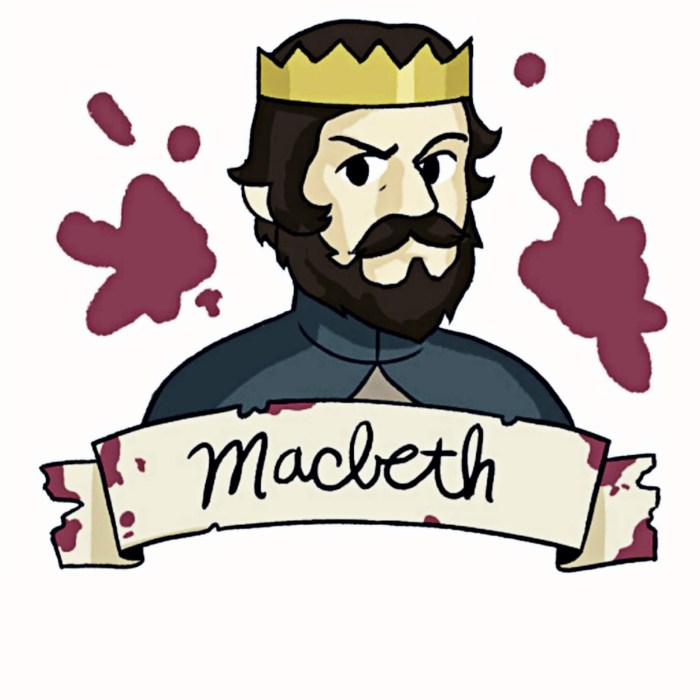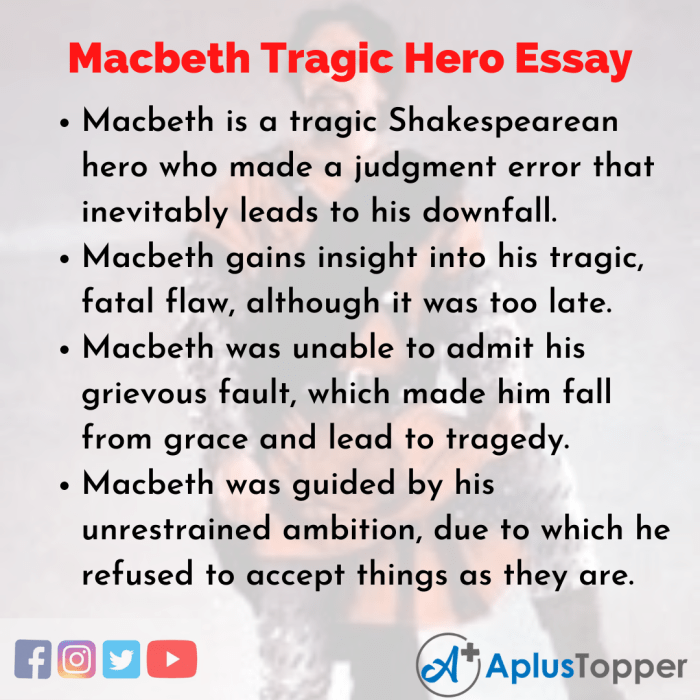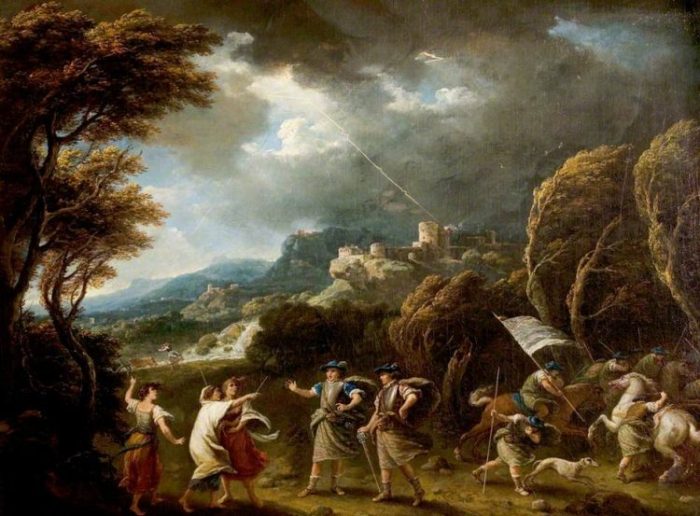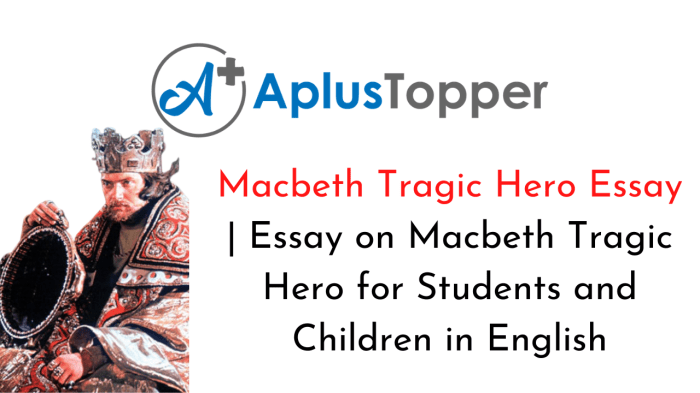Macbeth the tragic hero essay – Delving into the depths of Shakespeare’s masterpiece, “Macbeth the Tragic Hero,” we embark on a journey into the heart of a complex and enigmatic character. From his noble beginnings as a valiant warrior to his descent into a ruthless tyrant, Macbeth’s tragic arc captivates readers and audiences alike.
Through the lens of characterization, fate, and symbolism, this essay unravels the intricate tapestry of Macbeth’s downfall, exploring the interplay between ambition, insecurity, and the consequences of unchecked power.
Macbeth’s Characterization

Macbeth’s journey from a noble warrior to a ruthless tyrant is a complex and tragic one. His ambition and insecurity, fueled by the influence of Lady Macbeth, ultimately lead to his downfall.
Ambition and Insecurity
- Macbeth’s initial reluctance to murder Duncan stems from his innate sense of morality and loyalty.
- However, his ambition and desire for power gradually erode these principles, leading him down a path of violence and deceit.
- His insecurity and paranoia, stemming from his guilt and fear of retribution, drive him to eliminate any perceived threats, including his friends and family.
Lady Macbeth’s Influence
- Lady Macbeth plays a crucial role in Macbeth’s transformation by manipulating his emotions and encouraging his ambition.
- Her forceful personality and unwavering determination provide Macbeth with the necessary impetus to commit the heinous act of murder.
- However, her own guilt and mental instability ultimately contribute to her demise, leaving Macbeth alone to face the consequences of their actions.
The Role of Fate and Prophecy: Macbeth The Tragic Hero Essay

The witches’ prophecies play a pivotal role in shaping Macbeth’s destiny. Their predictions, like threads of fate, entwine themselves around his ambition, driving him towards a tragic end. Macbeth’s initial skepticism gradually transforms into an obsessive belief, fueling his aspirations for power and leading him down a path of darkness.
The Illusion of Free Will
While the witches’ prophecies undoubtedly influence Macbeth’s actions, the extent to which they determine his fate remains a subject of debate. Macbeth possesses free will, yet his choices are often clouded by the prophecies, which become a self-fulfilling cycle. He could have resisted their allure, but his ambition and insecurity ultimately betray him.
Guilt and Retribution
As Macbeth’s actions spiral into violence, guilt and remorse become his constant companions. The weight of his crimes weighs heavily upon his soul, tormenting him with visions of his victims. The play explores the inescapable nature of retribution, as Macbeth’s evil deeds ultimately lead to his downfall and the destruction of his kingdom.
Gender and Power Dynamics

Macbeth explores complex gender roles and power dynamics, challenging traditional norms. Lady Macbeth, initially portrayed as ambitious and dominant, drives Macbeth’s path to tyranny. Yet, as the play progresses, their roles reverse, with Macbeth embracing his masculinity and Lady Macbeth descending into madness.
Power Struggle between Macbeth and Lady Macbeth
Macbeth’s initial hesitancy contrasts with Lady Macbeth’s unwavering ambition. She manipulates and pressures him into committing murder, taking on a masculine role in their relationship. However, as Macbeth’s guilt and ambition grow, he asserts his dominance, becoming more ruthless and ambitious than his wife.
Before you delve into the complexities of Macbeth’s tragic downfall, it’s essential to brush up on your Spanish grammar. Practice your “ir + a + infinitive” constructions with our comprehensive ir + a + infinitive worksheet . This will enhance your ability to describe Macbeth’s intentions and actions, enriching your analysis of his tragic journey.
Challenges to Traditional Gender Norms, Macbeth the tragic hero essay
- Lady Macbeth’s assertive and manipulative nature defies traditional feminine ideals.
- Macbeth’s descent into tyranny shows the destructive consequences of unchecked ambition and masculinity.
- The play suggests that both men and women are capable of great evil and ambition, regardless of gender roles.
Language and Symbolism

In Macbeth, language and symbolism play a crucial role in conveying the play’s themes and creating a haunting atmosphere. Shakespeare employs vivid imagery, metaphors, and symbols to explore the complexities of the human psyche, the corrosive effects of ambition, and the interplay between fate and free will.
Imagery and Metaphor
Shakespeare’s use of imagery and metaphor in Macbethis particularly striking. The play is replete with vivid descriptions of violence, blood, and darkness, creating a sense of foreboding and unease. For example, Macbeth’s hands are described as “gory” and “defiled,” reflecting his guilt and the consequences of his actions.
The repeated use of the word “blood” throughout the play symbolizes the violence and bloodshed that accompany Macbeth’s rise to power.
Symbols
Macbethis also rich in symbolism. The witches, who appear in the opening scene, represent the forces of chaos and evil that tempt Macbeth to commit his crimes. The dagger that Macbeth sees before him before murdering Duncan symbolizes his ambition and the bloody path he must take to achieve it.
The blood that appears on Macbeth’s hands after the murder symbolizes his guilt and the consequences of his actions.
Language and Foreshadowing
Language also plays a significant role in foreshadowing and creating suspense in Macbeth. The witches’ prophecies, for example, foreshadow Macbeth’s rise to power and his eventual downfall. The play’s use of ambiguity and irony also creates a sense of uncertainty and suspense, keeping the audience on the edge of their seats.
Historical and Cultural Context

The historical context of Macbeth significantly influenced the play’s themes, characters, and plot. Set in 11th century Scotland, the play reflects the political and social turmoil of the period, marked by violent power struggles and a belief in the supernatural.
The character of Macbeth himself is based on a real-life Scottish king who reigned from 1040 to 1057. Shakespeare’s portrayal of Macbeth as an ambitious and ruthless tyrant is influenced by the historical accounts of his reign.
Cultural Beliefs and Superstitions
The play is deeply rooted in the cultural beliefs and superstitions of the time. The characters’ actions are often motivated by their fear of the supernatural, such as the witches’ prophecies and the ghost of Banquo. The play also reflects the Elizabethan worldview, which believed in the divine right of kings and the importance of maintaining order and stability.
Relevance to Modern Audiences
Despite its historical setting, Macbeth remains relevant to modern audiences. The play’s themes of ambition, power, and the consequences of evil are timeless and resonate with audiences today. The play’s exploration of the human psyche and the dangers of unchecked ambition make it a cautionary tale that continues to be relevant in contemporary society.
FAQ
What is the central conflict in “Macbeth”?
Macbeth’s tragic flaw of ambition and his struggle against fate.
How does Lady Macbeth influence Macbeth’s actions?
Lady Macbeth’s manipulation and ambition drive Macbeth to commit heinous crimes.
What is the significance of the witches’ prophecies?
The witches’ prophecies plant the seeds of ambition in Macbeth’s mind and set him on a path of destruction.